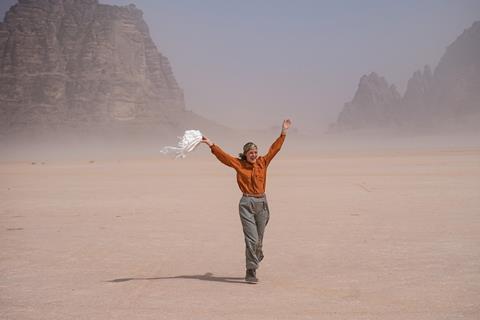Vicky Krieps takes the lead in this sumptuous portrait of German prefeminist writer Ingeborg Bachmann

Dir/scr: Margarethe von Trotta. Switz-Ger-Lux-Austria-Jordan-Italy. 2023. 111mins
You don’t need to know a lot about Austrian writer Ingeborg Bachmann, who established herself as one of the leading German-language literary figures of the 1950s and 1960s before dying in 1973 at the age of only 47, to appreciate what is essentially a film about a female artist attempting to her assert her creative and emotional freedom in a world controlled by men. Avoiding her final years of alcoholism and pill abuse in Rome, veteran German director Margarethe von Trotta chooses to focus instead on two episodes that cover Bachmann’s life between 1958 and the mid-1960s, when she was a feted literary celebrity: her difficult relationship with the older Swiss writer Max Frisch, and her journey into the Egyptian Sahara with a young male companion following her break-up with Frisch.
There’s perhaps just too much sheen to this heartfelt portrait for it to really bite
Von Trotta’s film is one creative woman’s clear, unapologetic tribute to a writer who was adopted as something of a feminist icon after her death, yet is little read today. The resurrection is cemented by Vicky Krieps, who walks a mesmerising tightrope between strength and fragility in her nuanced account of the free-thinking, chain-smoking Bachmann. Something of a companion piece to the director’s 2012 film Hannah Arendt, Ingeborg Bachmann – Journey Into The Desert is likely to enjoy a comparable prestige arthouse run in German-language markets, but could turn out to be a tougher sell elsewhere.
What is perhaps surprising is just what a sumptuous consecration this is. The succession of beautiful dresses worn by Krieps; the golden-hour light as she surveys Rome from the Pincio hill; an Egyptian riad interior that is lit like an Orientalist painting by Rudolf Ernst; a lush orchestral soundtrack – all of these bespeak an ‘official’ biopic a long way from the edgy nature of the work Bachmann was turning out at this time. (Or indeed from the only film adaptation to date of one of Bachmann’s works, Werner Schroeter’s abrasive, fragmented 1991 version of her novel Malina, starring Isabelle Huppert).
Von Trotta has always had a talent for structure, and her self-penned script provides a masterclass in how to interleave two distinct periods of a character’s life so that one illuminates and comments on the other. Almost unrecognisable as the lead of Christian Petzold’s Barbara and Phoenix, Ronald Zehrfeld plays Bachmann’s on-off partner of four years, novelist and dramatist Max Frisch, as an old-school chauvinist sheltering inside an avant-garde literary shell, whose romancing of his younger colleague gradually curdles into jealousy and control. Escaping their menage in Zurich and the machine-gun torment of Frisch’s morning writing sessions – done on a typewriter, with one finger – Bachmann flees to her favourite city, Rome, where she finds solace in the laid-back lifestyle and easy-going company of musician Hans Wener Henze (Basil Eidenbenz), whose contemporary opera librettos she helps to pen.
Cut into this narrative are scenes set in Egypt, where a tired, wan Bachmann is seen arriving in a desert oasis town with a younger companion, Adolf Opel (Tobias Resch). It’s only gradually that we learn where to place these sequences – after her emotionally devastating break-up with Frisch, which also seems to have been the cause of two brief scenes, at the beginning and end, set in a sanatorium or psychiatric hospital.
Bachmann is portrayed here as a free soul conditioned by times that have not yet caught up with her. In a radio interview, she opines that “Fascism is the first thing in the relationship between a man and a woman”; and yet she can’t shake her emotional dependency on Frisch, or override the impulse to do the washing-up he’s too busy to touch. One wry scene shows her standing on a podium giving an impassioned lecture about creative freedom, then reverse cuts to reveal an audience consisting almost entirely of men in suits.
Yet there’s something a little clichéd about the nature of the freedom Trotta’s Bachmann finds in Egypt as she heals and blossoms under the desert sun – one aspect of which consists of four-in-a-bed sex with Adolf and a couple of local lads, shot tastefully from overhead. In the end, there’s perhaps just too much sheen to this heartfelt portrait for it to really bite. But it remains a touching tribute to a woman who, von Trotta suggests, pitted a radical desire to question everything against the comfortable certainties of the men who surrounded her.
Production companies: tellfilm, tellfilm, Amour Fou Vienna, Heimatfilm, Amour Fou Luxembourg
International sales: The Match Factory, info@matchfactory.de
Producers: Katrin Renz, Bady Minck, Bettina Brokemper, Alexander Dumreicher-Ivancean
Production design: Su Erdt
Editing: Hansjorg Weissbrich
Cinematography: Martin Gschlacht
Music: Andre Mergenthaler
Cast: Vicky Krieps, Ronald Zehrfeld, Tobias Resch, Basil Eidenbenz







![The Brightest SunScreen[Courtesy HKIFF]](https://d1nslcd7m2225b.cloudfront.net/Pictures/274x183/3/5/0/1448350_thebrightestsunscreencourtesyhkiff_312678.jpg)














![The Brightest SunScreen[Courtesy HKIFF]](https://d1nslcd7m2225b.cloudfront.net/Pictures/100x67/3/5/0/1448350_thebrightestsunscreencourtesyhkiff_312678.jpg)

